|
 ecent
studies of the southern regions of your home planet,
Arth, have uncovered remarkable evidence of an ancient
subterranean culture that existed thousands of years
ago. This all-but-forgotten race of humans apparently
arrived on Arth in a giant spaceship, Noah. They were
seemingly escaping annihilation by three alien races:
Uhleks, Gazurtoids, and Phlegmaks. The ship came from
a planet that until now only existed in legend: the
planet earth. ecent
studies of the southern regions of your home planet,
Arth, have uncovered remarkable evidence of an ancient
subterranean culture that existed thousands of years
ago. This all-but-forgotten race of humans apparently
arrived on Arth in a giant spaceship, Noah. They were
seemingly escaping annihilation by three alien races:
Uhleks, Gazurtoids, and Phlegmaks. The ship came from
a planet that until now only existed in legend: the
planet earth.
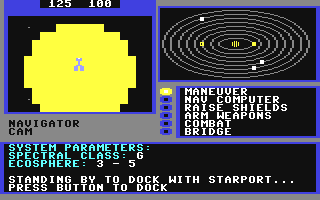
Suddenly
intent on discovering their roots, the population of
Arth has Interstel embark on a huge exploration experiment.
Having rediscovered and mastered earth's knowledge of
space-travel, Interstel charge a team of trainee space
cadets (including yourself) with the task of exploring
the galaxy to find out exactly what happened to earth.
The
project isn't government-aided and funds are relatively
low, hence you're only equipped with a basic ship to
begin with. It's up to you and your crew to find and
bring back minerals, alien artifacts and new lifeforms,
trading them for cash to buy ever-better ships to explore
deeper and deeper into space.
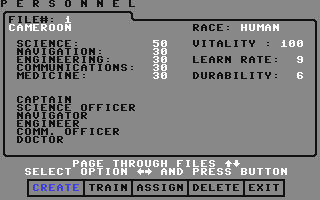
You
begin your vast and intrepid commission safe and sound
in Starport. Represented by a little man in a red space
suit, you may choose from a number of options while
docked here: you could visit the bank to admire your
assets or pop into the trade depot to buy a new engine,
shields, laser cannon, or missiles for your ship. However,
it's recommended that you purchase four boring cargo
pods for your ship before you do anything else. The
drop in on personnel and get yourself a crew. You've
a choice of human, reptilian, insect-like, plant-like
or android personnel, each specialising (but still requiring
expensive training) in navigation, science, engineering,
medicine, and so on.
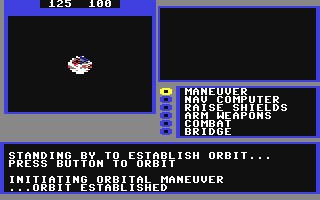
Your
ship (which you have the pleasure of naming before it's
launched) comes equipped with an engine (of sorts) and
a little fuel. So once you've assigned your crew their
posts, you may boldly go where everybody else seems
to be going. It makes sense to explore your own solar
system before heading off into deepest space, to get
used to the game controls. Also you can collect some
quite profitable minerals, allowing you to upgrade your
ship for when you feel ready to spread your wings.
Collecting
minerals, artifacts and so on from planets is achieved
by piloting a terrain vehicle around your ship's landing
site (fuel limits restrict travel), picking up items
and info as you go.
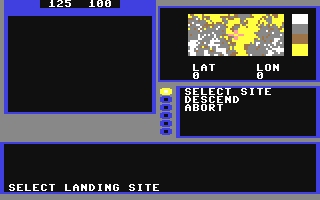
As
play progresses and you discover more and more about
your immediate surroundings, little snippets of information
come your way concerning the instability of Arth's sun.
And it seems this is more than a natural phenomenon.
Your task takes a more urgent pace as you need to discover
as much as possible about your galaxy, hoping for clues
as to what's happening to your sun before it goes nova.
Play
is slow to begin with and watching your ship land on
planets takes an age. However, the landing sequence
may be turned off and once you begin to explore outside
Arth's system, Starflight becomes very interesting.
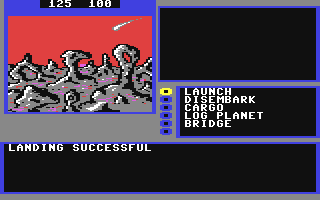
There
are 270 star systems and 800 planets waiting to be discovered,
with minerals, ancient (and recent) ruins, alien lifeforms
and artifacts there for the plundering.
Fortunately
for the sake of lasting interest, not everything goes
your way: space combat (or its avoidance) plays a large
part in Starflight as do other elements derogatory
to your success, such as running out of fuel or energy
(easier to do than you might like), the crushing gravity
of some planets, engine or communications failure, planetside
storms and hostile lifeforms; it's a hard life in the
Interstel Space Corps.
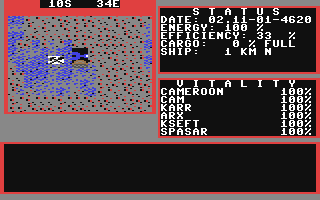
Although
sound is pathetic and animation poor, Starflight
is intriguing to play. There exists a real sense of
discovery and even excitement as you dare to travel
further from Arth. And it's a real good feeling to leave
Starport in control of a ship so well decked out with
shields, lasers, missiles, and a thrusting, throbbing
mega-engine that she could give even the Enterprise
a tough time . . . if only I had Kirk's crew.
Really-useful-information
dept:
A C64 version should be available in March, priced £14.99.
|